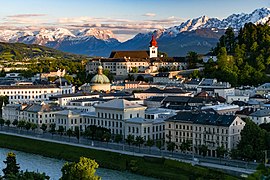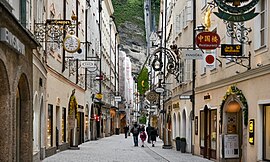This article needs additional citations for verification. (June 2023) |
Salzburg | |
|---|---|
|
Top to bottom, left to right: view of University of Salzburg in front of the Salzach, with Nonnberg Abbey in the background; Hohensalzburg Fortress; Salzburg Cathedral; Roittner-Durchhaus; and Getreidegasse | |
| Coordinates: 47°48′00″N 13°02′42″E / 47.80000°N 13.04500°E | |
| Country | |
| Federal state | Salzburg |
| District | Statutory city |
| Government | |
| • Mayor | Bernhard Auinger (SPÖ) |
| Area | |
| • Total | 65.65 km2 (25.35 sq mi) |
| Elevation | 424 m (1,391 ft) |
| Population (1 October 2020)[2] | |
| • Total | 157,245 |
| • Density | 2,400/km2 (6,200/sq mi) |
| Demonym(s) | English: Salzburger or Salzburgian German: Salzburger (m.), Salzburgerin (f.) |
| Time zone | UTC+1 (CET) |
| • Summer (DST) | UTC+2 (CEST) |
| Postal code | 5020 |
| Area code | 0662 |
| Vehicle registration | S |
| Website | www |
| UNESCO World Heritage Site | |
|---|---|
 | |
| Criteria | Cultural: ii, iv, vi |
| Reference | 784 |
| Inscription | 1996 (20th Session) |
| Area | 236 ha |
| Buffer zone | 467 ha |
Salzburg[a] is the fourth-largest city in Austria. In 2020, it had a population of 156,852.[7]
The town is on the site of the Roman settlement of Iuvavum. Salzburg was founded as an episcopal see in 696 and became a seat of the archbishop in 798. Its main sources of income were salt extraction, trade, as well as gold mining. The fortress of Hohensalzburg, one of the largest medieval fortresses in Europe, dates from the 11th century. In the 17th century, Salzburg became a center of the Counter-Reformation, with monasteries and numerous Baroque churches built.
Salzburg's historic center (German: Altstadt) is renowned for its Baroque architecture and is one of the best-preserved city centers north of the Alps. The historic center was enlisted as a UNESCO World Heritage Site in 1996.[8] The city has three universities and a large population of students.
- ^ "Dauersiedlungsraum der Gemeinden Politischen Bezirke und Bundesländer - Gebietsstand 1.1.2018". Statistics Austria. Retrieved 10 March 2019.
- ^ "Salzburg in Zahlen". Archived from the original on 24 June 2020. Retrieved 23 June 2020.
- ^ "Salzburg". Lexico UK English Dictionary. Oxford University Press. Archived from the original on 8 January 2020.
- ^ "Salzburg". Collins English Dictionary. HarperCollins. Archived from the original on 29 May 2019. Retrieved 29 May 2019.
- ^ "Salzburg". The American Heritage Dictionary of the English Language (5th ed.). HarperCollins. Retrieved 29 May 2019.
- ^ "Salzburg". Merriam-Webster.com Dictionary. Merriam-Webster. Retrieved 29 May 2019.
- ^ "Österreich – Größte Städte 2019". Statista (in German). Archived from the original on 3 March 2024. Retrieved 1 December 2019.
- ^ "Historisches Zentrum der Stadt Salzburg". Archived from the original on 14 June 2021. Retrieved 10 July 2021.
Cite error: There are <ref group=lower-alpha> tags or {{efn}} templates on this page, but the references will not show without a {{reflist|group=lower-alpha}} template or {{notelist}} template (see the help page).









